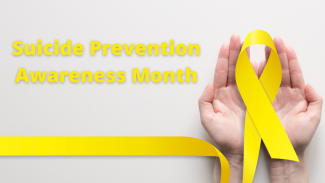Suicide Prevention Month: Mental Health Resources
We’re experiencing a lot of hardship locally and nationally.
The District has lost more than 600 residents to the Coronavirus pandemic and more than 15,000 residents have contracted the virus. More than 145,000 unemployment claims have been filed by individuals suddenly without work.
A social reckoning has come alive across the US and the world calling for an end to systematic racism and equitable treatment for all. We’ve experienced tremendous loss of prominent figures in entertainment, politics, and our justice system. Many are experiencing loneliness from having to physically isolate from our close-knit communities to stay safe and healthy during the pandemic.
We should never underestimate the impact these events can have on our mental health.
This Suicide Prevention Month, the Office of the Attorney General wants you to know that you are not alone. If you or someone you know has expressed thoughts of suicide or struggles with their mental health, please share this list of resources with them. There are professionals available to help all of us navigate these trying times.
Community Response Team (CRT)
The District’s Community Response Team (CRT) offers 24-hour services to individuals experiencing psychiatric emergencies or trauma, or are showing signs of mental health or substance use disorders. CRT offers pre-arrest diversion services, so individuals facing mental illness and/or substance use disorders who may otherwise be arrested, can receive support when they come into contact with MPD and the criminal justice system. CRT also has outreach teams that offer interventions to people experiencing homelessness, including helping them locate appropriate shelter. You can receive help by:
- Visiting dbh.dc.gov/service/community-response-team.
- Visiting dbh.dc.gov/service/homeless-services-dmh.
- Calling 202-673-6495.
ACCESS Helpline
The ACCESS Helpline can provide community-based behavioral health services for adults including assessment services, counseling, medication, intensive day treatment, and housing assistance. You can receive help by:
- Visiting dbh.dc.gov/service/adult-services.
- Calling 1-888-793-4357.
*Note, DBH provides behavioral health services and supports to unique populations, including individuals who are deaf/hearing impaired, limited or no English speaking, or who have co-occurring intellectual disabilities.
DC Chapter of the National Alliance on Mental Illness (NAMI DC)
NAMI DC provides advocacy, education, support, and public awareness so that all individuals and families affected by mental illness can build better lives. Their Helpline staff are available to provide a listening ear, support, education, and referrals to other resources in the community. You can receive help by:
- Visiting namidc.org.
- Emailing namidc@namidc.org.
- Calling 202-546-0646.
* Note, the NAMI DC Helpline is open Monday-Friday, 10am-1pm, ET and on weekends and holidays from 11am-6pm.
National Suicide Prevention Lifeline
The Lifeline provides 24/7, free and confidential support for people in distress, prevention and crisis resources for you or your loved ones, and best practices for professionals. You can receive help by:
- Visiting suicidepreventionlifeline.org.
- Calling 1-800-273-8255.
Crisis Text Line
The Crisis Text Line provides 24/7 free connections to a live, trained, crisis counselors. Whether you’re experiencing suicidal thoughts, abuse, sexual assault, depression, anxiety, bullying, and more – a crisis counselor can assist you. You can receive help by:
- Texting 741741.
OAG’s Mental Health Section works to protect District residents from harm by representing the Department of Behavioral Health so individuals can receive the court-ordered mental health support they need. OAG connects residents to treatment through 1) appointing a guardian and/or conservator for incapacitated individuals and 2) committing individuals for emergency treatment who are likely to injure themselves or others.

